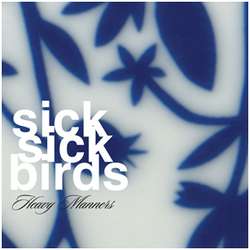A lot of bands are waving their 90s flags these days. And I don’t blame them. A) they grew up with the stuff and, B) I’ll take the Alternative Nation over the skinny jeans 20-aught set any day. (Yes, I’m an old man.)
Sick Sick Birds are a Baltimore group coming out of the punk scene, although their music doesn’t necessarily fit the aggressive, shouty set all that well. Containing one ex-member of The Thumbs (founding member and fellow-Thumb Bobby Borte is no long involved) definitely lumps them in that crowd, and it’s how I first heard about them myself. Regardless, Gates of Home is their second album and it’s time to put the comparisons to old bands to rest. With their newest release they’ve taken another step away from power chords and singalongs, instead looking at measured dynamics, progressions, and tempered aggression. What you get is a DIY, less produced version of 90s rock. The DIY approach takes away some of the bloat that affected a fair shake of 90s bands and the punk background likely plays into their shorter songs (a plus), giving a sloppier, roughshod take on familiar sounds of bands like The Pixies or The Lemonheads, defined by loud guitars, soft lead vocals, even softer backing vocals, and a lot of cymbal crashes.
“Conversion,” one of the notable songs, positions powerful, expressive vocals over plodding, picking guitars. The real movement of the song comes when the guitar and bass interplay. Another 90s-biting track is “Spinning Jenny,” which is one of the only songs where I’ve read a Pixies RIYL and actually heard the similarities. The song features excellent use of dual vocals, with Melissa Jacobsen’s back-ups offering a soothing and hushed harmony. A standout is “Marietta,” with emotive vocals from Mike Hall, nice harmonies courtesy of Jacobsen, and powerful effective breakdowns followed with on-pitch vocal delivery.
The band’s volume is primarily reserved for the choruses, which take on a little more shout-shout-let-it-all-out for a minute before the verses settle back into that quiet/loud dynamic shift. I could hear a bit of Thumbs coming through in Hall’s vocals in the speedier “One Town Over,” but that’s really the only time I thought back to his former band. With Hall assuming primary songwriting duties this time around, the band has taken a wider swath of structures and there’s very little “punk” to be found beyond the onesheet. Instead, the focal energy of the songs comes through subdued vocals that ebb during verses and erupt at chorus-time, flowing back into a hesitant complacence in between. Generally speaking, this formula applies across the board for Gates of Home but the songs aren’t the least bit samey. Each progression and guitar/bass interplay is unique and the sequencing gives an uninterrupted run through the nine songs.
It’s a strong record and definitely recommended for those who like 3-4 minute songs with a slacker aggression and thoughtful progression. It likely won’t blow you away, but the band is adept at what they do and they deliver a number of memorable tracks.




